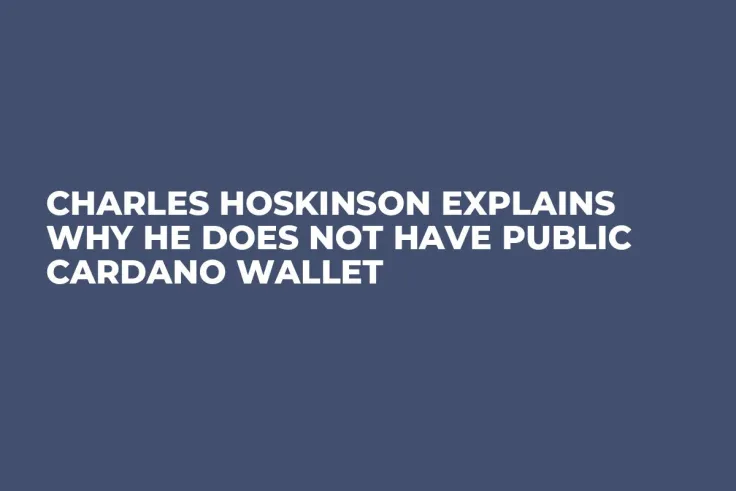
Disclaimer: The opinions expressed by our writers are their own and do not represent the views of U.Today. The financial and market information provided on U.Today is intended for informational purposes only. U.Today is not liable for any financial losses incurred while trading cryptocurrencies. Conduct your own research by contacting financial experts before making any investment decisions. We believe that all content is accurate as of the date of publication, but certain offers mentioned may no longer be available.
Cardano's founder, Charles Hoskinson, recently sparked a significant discussion on the X platform when he was asked why, unlike Ethereum's founder Vitalik Buterin, he does not have a public wallet address.
The question was asked by a user who pointed out the apparent inconsistency between the two founders' approaches. "Friendly reminder that Vitalik Buterin, the founder of Ethereum and favorite piñata of the Cardano Community, has a public wallet address, while Cardano's founder does not," the user wrote.
I don't have public addresses because of security. People can send transactions without my consent from sanctioned nations and wallets like the tornado cash issue to me and thus blacklist my account. This is why I like the concept of contingent settlement
— Charles Hoskinson (@IOHK_Charles) July 29, 2023
In response, Hoskinson stated that the decision not to have a public address is rooted in security concerns. According to him, a public address could potentially receive transactions from sanctioned nations and wallets, thus leading to a potential blacklist of his account.
He explained that unauthorized transactions could be sent from nations under sanctions or from wallets like the tornado cash, potentially resulting in the blacklisting of his account. This stance further justifies his appreciation for the concept of contingent settlement.
Hoskinson's explanation sparked a string of follow-up questions from the community, leading to a spirited discussion. One member of the community questioned whether Hoskinson's viewpoint was suggestive of promoting contingent transactions on Cardano, insinuating a shift from the conventional permissionless nature of blockchains.
Responding to the query, a fellow user jumped in to defend Hoskinson. They countered the allegation, asking the skeptic to carefully interpret Hoskinson's explanation, highlighting that he had not explicitly supported any changes relating to "contingent transactions." They further emphasized that given the open, permissionless and free nature of blockchain, Hoskinson should be allowed to manage his interactions in the way he deems fit.

 Dan Burgin
Dan Burgin Vladislav Sopov
Vladislav Sopov